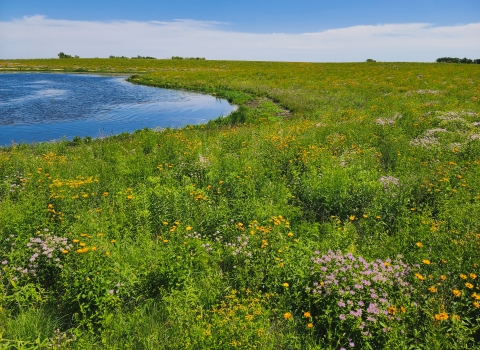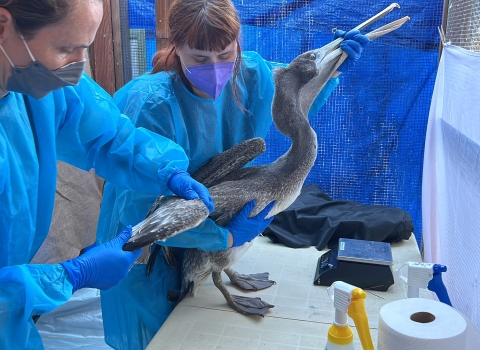OLYMPIA, Wash. – U.S. Secretary of the Interior Sally Jewell today joined federal, state, tribal and community leaders to celebrate the renaming of Nisqually National Wildlife Refuge as the Billy Frank Jr. Nisqually National Wildlife Refuge, in honor of the late, internationally recognized Native American civil rights leader and Nisqually Tribal member. The ceremony also highlighted the newly established Medicine Creek Treaty National Memorial within the refuge.
“Billy Frank Jr. established a lasting legacy for tribal fishing rights and environmental advocacy that will be felt for generations, not only benefitting tribal communities but also our shared lands, waters, wildlife and heritage,” said Interior Secretary Sally Jewell. “He was an inspiration to all of us -- a true leader and change agent. The renaming of the now Billy Frank Jr. Nisqually National Wildlife Refuge reminds us that with passion, dedication and a mission, one man can make a big difference in the arc of conservation.”
On December 18, 2015, President Obama signed the “Billy Frank Jr. Tell Your Story Act” into Public Law (114-101). The act renamed the Nisqually National Wildlife Refuge in honor of Billy Frank Jr., a tireless advocate for Native American treaty rights and environmental stewardship. A member of the Nisqually Indian Tribe, he founded the Northwest Indian Fisheries Commission and served as its chairman for over 30 years.
"My dad worked his whole life for his tribe, for the people of Washington state to protect our environment, to protect our natural resources. He worked to protect our tribal treaty rights and protect our way of life,” said Nisqually Councilman Willie Frank III. “He was an amazing human being that never took a day off. He would be very humbled by this and would be the first one to acknowledge he never did this for himself. He did this for the great good of all of us.”
“Billy’s unexpected passing hit me hard, but I wasn’t the only one. This entire region, state, country, and even world felt the loss of Billy acutely,” said Congressman Denny Heck. “As we grieved, we looked for ways to keep telling his story. Adding his name to the place of his ancestors, a place preserved for our wildlife to live, was a small but important change we could make to keep him with us. Every time I drive by the sign, I remember my friend. With this designation, his legacy and environmental stewardship stays with us, and hopefully inspires others to stand up for what they believe in and make a difference.”
"From the banks of the Nisqually, to the steps of the Supreme Court, Billy Frank Jr. dedicated his life to giving a voice to millions of people in Washington state and around the country," Senator Patty Murray said. "As an environmental steward and a champion for hard-fought treaty rights, he was second to none. Naming this wildlife refuge in his honor is a fitting tribute: a place to protect and preserve for generations to come, for the benefit of all.?”
“Billy Frank Jr. was a fierce guardian of the Puget Sound’s rich natural and cultural diversity, deeply cherished by all who call Washington state home. It is only right given Billy Frank Jr.’s life, legacy, and impact on Washington state and the nation, that we honor him by forever connecting his name to the Nisqually National Wildlife Refuge,” said Senator Maria Cantwell. “With this designation we pay tribute to the man who devoted his life to protecting the rights of Native Americans, the principles of environmental stewardship, and precious salmon of the Pacific Northwest.”
“Whether it was about treaty rights, salmon recovery, or other topics, when Billy Frank Jr. spoke, people listened,” said Congressman Derek Kilmer. “His words always had future generations in mind. That’s what makes this renaming so significant, and why I'm grateful to Denny Heck for taking the lead on this effort. Future generations will know who Billy was and what he stood for. And we can only hope that they follow his lead and do their part to take care of this earth while they’re here.”
The act also established the Medicine Creek Treaty National Memorial to commemorate the location of the signing of the treaty between the federal government and members of the Medicine Creek Treaty tribes. The Medicine Creek Treaty tribes named in the act include the Nisqually Indian Tribe, Squaxin Island Tribe, Puyallup Tribe of Indians and Muckleshoot Indian Tribe.
"To have such an honoring and ceremonial event for the Nisqually Indian Tribe's great leader in Billy Frank Jr. so close to the original signing of the Medicine Creek Treaty is very powerful,” said Nisqually Chairman Farron McCloud. “Chief Leschi instilled into all his people to always keep fighting for what is rightfully yours and that continues today. To have Squaxin Island, Muckelshhoot, Puyallup and Nisqually all at the same site together again is very historic."
During the ceremony, the Nisqually Canoe Family performed traditional songs. Secretary Jewell, USFWS Pacific Regional Director Robyn Thorson, members of the Washington congressional delegation, members of the Medicine Creek Treaty tribes, the family of Billy Frank Jr., and representatives of partner organizations provided remarks.
"I am taken back to 162 years ago, and the 1854 Medicine Creek Treat, the inconceivable abundance of these lands at that time, our ancestral economy and how it maintained and was what upheld the social fabric of our communities- and it still does to this day,” said Muckleshoot Councilman Louie Ungaro. “We are back at the crossroads again, and the Tell Your Story Act is a start for us to better educate the state of Washington and others, of who we are and how we still exist."
Before the ceremony, the Secretary met with children from the Squaxin Island Summer Recreation Program. The kindergarten through sixth grade students were at the refuge to take part in an environmental education program that provides a hands-on opportunity for children to connect with the fish, wildlife, and habitats of the Nisqually River delta.
In 1974, the now-named Billy Frank Jr. Nisqually National Wildlife Refuge was established to protect the Nisqually River delta and its diversity of fish and wildlife habitats. After a century of diking off tidal flow, the Nisqually estuary restoration project in 2009 reconnected 762 acres of historic flood plains on the refuge with the tides of Puget Sound. This restoration project was funded by numerous federal, state, and local sources, including other Puget Sound watershed partnerships with salmon recovery funding. This is the largest estuary restoration project in the Pacific Northwest and an important step in the recovery of Puget Sound.
The Nisqually River Delta, a biologically rich and diverse area at the southern end of Puget Sound, supports a variety of habitats. Here, the freshwater of the Nisqually River combines with the saltwater of Puget Sound to form an estuary rich in nutrients and detritus. These nutrients support a web of sea life - the benefits of which extend throughout Puget Sound and beyond.


